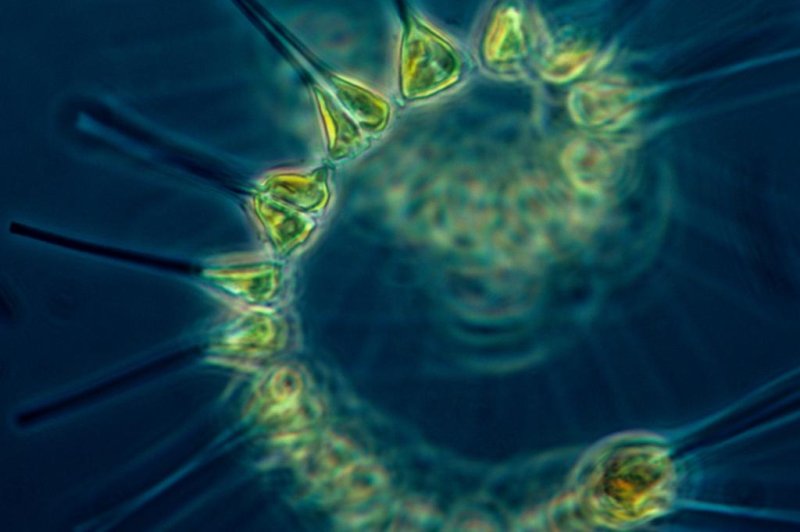Phytoplankton relies on ocean mixing to bring nutrients to the surface where they live. But in a stratified ocean, there is likely to be less mixing, and thus, smaller phytoplankton populations. Photo by
NOAA MESA Project/Wikimedia
Jan. 27 (UPI) -- Contrary to the expectations of many environmental scientists, a new model has predicted a likely boom in tropical phytoplankton abundance as the century progresses.
Phytoplankton anchor the aquatic food web. Most scientists assumed this community of photosynthesizing bacteria and plant-like diatoms would struggle in the tropics as the oceans become increasingly stratified, with heavier cold water situated deep beneath the surface and lighter warm water isolated on top.
Phytoplankton relies on ocean mixing to bring nutrients to the surface where they live. But in a stratified ocean, there is likely to be less mixing, and thus, smaller phytoplankton populations.
"All the climate models have this mechanism built into them, and it has led to these well-established predictions that phytoplankton productivity, biomass and export into the deep ocean will all decline with climate change," lead researcher Adam Martiny, professor of oceanography at the University of California, Irvine, said in a news release. "Earth system models are largely based upon laboratory studies of phytoplankton, but of course laboratory studies of plankton are not the real ocean."
Traditionally, scientists measure phytoplankton abundance by measuring the concentration of chlorophyll in the water. Previous studies have revealed lower levels of chlorophyll in warmer, tropical waters and higher concentrations in ocean water collected farther away from the equator.
"The problem is that chlorophyll is not everything that's in a cell, and actually in low latitudes, many plankton are characterized by having a very small amount of it; there's so much sunlight, plankton only need a few chlorophyll molecules to get enough energy to grow," Martiny said. "In reality, we have had so far very little data to actually demonstrate whether or not there is more or less biomass in regions undergoing stratification. As a result, the empirical basis for less biomass in warmer regions is not that strong."
To build a more accurate ocean systems model, Martiny and his colleagues sampled phytoplankton communities at thousands of locations all over the globe. Their efforts revealed surprising levels of phyotplankton abundance in tropical waters.
Most of the phytoplankton living in the tropics are tiny cells called picophytoplankton. Though tiny compared the the phytoplankton living in cooler climates, picophytoplankton are abundant in warm water.
When scientists provided ocean models with their new phytoplankton survey data, the simulations showed increases in ocean temperature are likely to boost phytoplankton abundance.
"In many regions there would be an increase of 10 to 20 percent of plankton biomass, rather than a decline," Martiny said. "Machine learning is not biased by the human mind. We just give the model tons and tons of data, but they can help us challenge existing paradigms."
Scientists described the results of their new model in a new paper published Monday in the journal Nature Geoscience.
Though ocean warming is likely diminishing the levels of ocean mixing that bring nutrients to the surface, scientists suspect warm water phytoplankton will find new ways to get the nutrients they need to proliferate.
"When plankton die -- especially these small species -- they sit around for a while longer, and maybe at high temperature other plankton can more easily degrade them and recycle the nutrients back to build new biomass," Martiny said.
Researchers said their findings aren't proof that climate change won't negatively impact marine ecosystems, only that phytoplankton communities are more resilient than previously suggested.
And if climate change continues unabated, scientists warned that the results could be catastrophic for all kinds of marine organisms.
"We could obviously let climate change get out of hand and go into completely uncharted territory, and then all bets are off," Martiny said. "But at least for a while, I think the adaptive capabilities in these diverse plankton communities will help them maintain high biomass despite these environmental changes."















